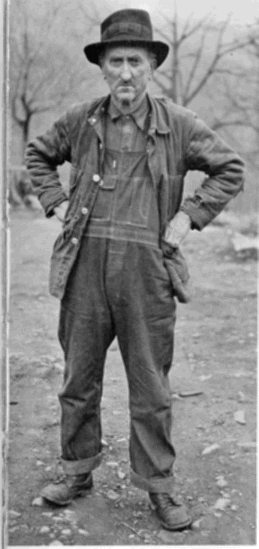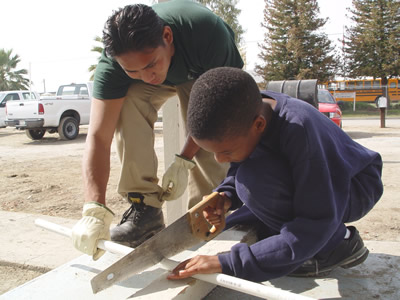Donuts for the Class
 Tuesday, July 17, 2007 at 11:10PM
Tuesday, July 17, 2007 at 11:10PM  (This article was written by an anonymous author. If anyone knows the source, I would be happy to provide the attribution.)
(This article was written by an anonymous author. If anyone knows the source, I would be happy to provide the attribution.)
There was a certain Professor of Religion named Dr. Christianson, a studious man who taught at a small college in the Western United States. Dr. Christianson taught the required survey course in Christianity at this particular institution. Every student was required to take this course his or her freshman year regardless of his or her major. Although Dr. Christianson tried hard to communicate the essence of the gospel in his class, he found that most of his students looked upon the course as nothing but required drudgery. Despite his best efforts, most students refused to take Christianity seriously.
This year, Dr. Christianson had a special student named Steve. Steve was only a freshman, but was studying with the intent of going onto seminary for the ministry. Steve was popular, he was well liked, and he was an imposing physical specimen. He was now the starting center on the school football team, and was the best student in the professor’s class.
One day, Dr. Christianson asked Steve to stay after class so he could talk with him.
“How many push-ups can you do “
Steve said, “I do about 200 every night.”
“200 That’s pretty good, Steve,” Dr. Christianson said. “Do you think you could do 300 “
Steve replied, “I don’t know… I’ve never done 300 at a time.”
“Do you think you could ” again asked Dr. Christianson.
“Well, I can try,” said Steve.
“Can you do 300 in sets of 10 I have a class project in mind and I need you to do about 300 push-ups in sets of ten for this to work. Can you do it I need you to tell me you can do it,” said the professor.
Steve said, “Well… I think I can…yeah, I can do it.”
Dr. Christianson said, “Good! I need you to do this on Friday. Let me explain what I have in mind.”
Friday came and Steve got to class early and sat in the front of the room. When class started, the professor pulled out a big box of donuts. No these weren’t the normal kinds of donuts, they were the extra fancy BIG kind, with cream centers and frosting swirls. Everyone was pretty excited it was Friday, the last class of the day, and they were going to get an early start on the weekend with a party in Dr. Christianson’ s class.
Dr. Christianson went to the first girl in the first row and asked, “Cynthia, do you want to have one of these donuts “
Cynthia said, “Yes.”
Dr. Christianson then turned to Steve and asked, “Steve, would you do ten push-ups so that Cynthia can have a donut “
“Sure.” Steve jumped down from his desk to do a quick ten. Then Steve again sat in his desk. Dr. Christianson put a donut on Cynthia’s desk.
Dr. Christianson then went to Joe, the next person, and asked, “Joe, do you want a donut “
Joe said, “Yes.”
Dr. Christianson asked, “Steve would you do ten push-ups so Joe can have a donut ” Steve did ten push-ups, Joe got a donut. And so it went, down the first aisle, Steve did ten pushups for every person before they got their donut. And down the second aisle, till Dr. Christianson came to Scott.
Scott was on the basketball team, and in as good condition as Steve. He was very popular and never lacking for female companionship. When the professor asked, “Scott do you want a donut ” Scott’s reply was, “Well, can I do my own pushups “
Dr. Christianson said, “No, Steve has to do them.”
Then Scott said, “Well, I don’t want one then.”
Dr. Christianson shrugged and then turned to Steve and asked,
“Steve, would you do ten pushups so Scott can have a donut he doesn’t want ”
With perfect obedience Steve started to do ten pushups.
Scott said, “HEY! I said I didn’t want one!”
Dr. Christianson said, “Look, this is my classroom, my class, my desks, and these are my donuts. Just leave it on the desk if you don’t want it.” And he put a donut on Scott’s desk.
Now by this time, Steve had begun to slow down a little. He just stayed on the floor between sets because it took too much effort to be getting up and down. You could start to see a little perspiration coming out around his brow. Dr. Christianson started down the third row. Now the students were beginning to get a little angry.
Dr. Christianson asked Jenny, “Jenny, do you want a donut “
Sternly, Jenny said, “No.”
Then Dr. Christianson asked Steve, “Steve, would you do ten more Push-ups so Jenny can have a donut that she doesn’t want ” Steve did ten….Jenny got a donut.
By now, a growing sense of uneasiness filled the room. The students were beginning to say “No” and there were all these uneaten donuts on the desks.
Steve also had to really put forth a lot of extra effort to get these pushups done for each donut. There began to be a small pool of sweat on the floor beneath his face, his arms and brow were beginning to get red because of the physical effort involved.
Dr. Christianson asked Robert, who was the most vocal unbeliever in the class, to watch Steve do each push up to make sure he did the full ten pushups in a set because he couldn’t bear to watch all of Steve’s work for all of those uneaten donuts. He sent Robert over to where Steve was so Robert could count the set and watch Steve closely. Dr. Christianson started down the fourth row.
During his class, however, some students from other classes had wandered in and sat down on the steps along the radiators that ran down the sides of the room. When the professor realized this, he did a quick count and saw that now there were 34 students in the room. He started to worry if Steve would be able to make it. Dr. Christianson went on to the next person and the next and the next. Near the end of that row, Steve was really having a rough time. He was taking a lot more time to complete each set.
Steve asked Dr. Christianson, “Do I have to make my nose touch on each one “
Dr. Christianson thought for a moment, “Well, they’re your pushups. You are in charge now. You can do them any way that you want.” And Dr. Christianson went on.
A few moments later, Jason, a recent transfer student, came to the room and was about to come in when all the students yelled in one voice, “NO! Don’t come in! Stay out!” Jason didn’t know what was going on.
Steve picked up his head and said, “No, let him come.”
Professor Christianson said, “You realize that if Jason comes in you will have to do ten pushups for him “
Steve said, “Yes, let him come in. Give him a donut”
Dr. Christianson said, “Okay, Steve, I’ll let you get Jason’s out of the way right now. Jason, do you want a donut “
Jason, new to the room hardly knew what was going on. “Yes,” he said, “give me a donut.”
“Steve, will you do ten push-ups so that Jason can have a donut “
Steve did ten pushups very slowly and with great effort. Jason, bewildered, was handed a donut and sat down.
Dr. Christianson finished the fourth row, then started on those visitors seated by the heaters. Steve’s arms were now shaking with each push-up in a struggle to lift himself against the force of gravity. Sweat was profusely dropping off of his face and, by this time, there was no sound except his heavy breathing, there was not a dry eye in the room.
The very last two students in the room were two young women, both cheerleaders, and very popular. Dr. Christianson went to Linda, the second to last, and asked, “Linda, do you want a doughnut “
Linda said, very sadly, “No, thank you.”
Professor Christianson quietly asked, “Steve, would you do ten push-ups so that Linda can have a donut she doesn’t want ” Grunting from the effort, Steve did ten very slow pushups for Linda.
Then Dr. Christianson turned to the last girl, Susan. “Susan, do you want a donut “
Susan, with tears flowing down her face, began to cry. “Dr. Christianson, why can’t I help him “
Dr. Christianson, with tears of his own, said, “No, Steve has to do it alone, I have given him this task and he is in charge of seeing that everyone has an opportunity for a donut whether they want it or not. When I decided to have a party this last day of class, I looked at my grade book. Steve, here is the only student with a perfect grade. Everyone else has failed a test, skipped class, or offered me inferior work. Steve told me that in football practice, when a player messes up he must do push-ups. I told Steve that none of you could come to my party unless he paid the price by doing your push ups. He and I made a deal for your sakes. Steve, would you do ten push-ups so Susan can have a donut ” As Steve very slowly finished his last pushup, with the understanding that he had accomplished all that was required of him, having done 350 pushups, his arms buckled beneath him and he fell to the floor.
Dr. Christianson turned to the room and said. “And so it was, that our Savior, Jesus Christ, on the cross, plead to the Father, ‘into thy hands I commend my spirit.’ With the understanding that He had done everything that was required of Him, he yielded up His life. And like some of those in this room, many of us leave the gift on the desk, uneaten.” Two students helped Steve up off the floor and to a seat, physically exhausted, but wearing a thin smile. “Well done, good and faithful servant,” said the professor, adding “Not all sermons are preached in words.”
Turning to his class the professor said, “My wish is that you might understand and fully comprehend all the riches of grace and mercy that have been given to you through the sacrifice of our Lord and Savior Jesus Christ. He spared not only His Begotten Son, but gave Him up for us all for the whole Church, now and forever. Whether or not we choose to accept His gift to us, the price has been paid. Wouldn’t you be foolish and ungrateful to leave it laying on the desk “
- Author Unknown







